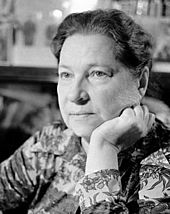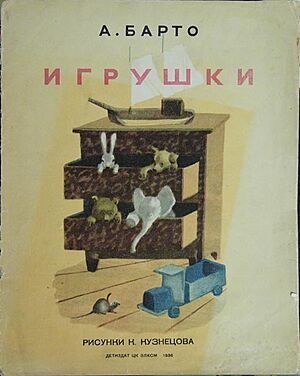Agniya Barto facts for kids
Quick facts for kids
Agniya Barto
|
|
|---|---|
 |
|
| Born | Gitel Leybovna Volova 17 February [O.S. 4 February] 1906 Moscow, Russian Empire |
| Died | 1 April 1981 (aged 75) Moscow, Soviet Union |
| Resting place | Novodevichy Cemetery, Moscow |
Agniya Lvovna Barto (Russian: А́гния Льво́вна Барто́; February 17, 1906 – April 1, 1981) was a famous Soviet poet and children's writer. She was known for her wonderful poems and stories that many generations of children have loved.
Contents
About Agniya Barto
Agniya was born Gitel Leybovna Volova in Moscow, Russia. Her family was Russian Jewish. Her father, Lev Nikolaevich Volov, was a veterinarian, and her mother, Maria, was from Kaunas, Lithuania.
Agniya first studied at a ballet school. She loved poetry and soon started writing her own. She tried to write like famous poets such as Anna Akhmatova and Vladimir Mayakovsky.
At her ballet school graduation, Agniya read her poems. The Minister of Education, Anatoly Lunacharsky, was there. He told her that she should become a professional poet instead of a ballerina. People say that even though her early poems were about love and revolution, Lunacharsky believed she would become a famous children's poet.
Becoming a Children's Author
Agniya married Pavel Barto, who was an electrical engineer and also a poet. Some of her early children's poems were published under both their names.
In 1925, she published her first books: Chinese boy Wan-Lin and Mishka the Petty Thief. Later, she published The First of May in 1926 and Brothers in 1928. These books were liked by the famous children's writer Korney Chukovsky.
In 1936, Agniya published a book of short poems for toddlers called Toys. This book made her one of the most popular children's authors. Millions of copies of her books were printed.
During World War II and Later Life
During World War II, Agniya wrote patriotic poems that supported her country. She also worked as a reporter for the newspaper Komsomolskaya Pravda on the Western Front.
In 1949, she received the State Stalin Prize for her book Poetry for Children. This was a very important award in the Soviet Union.
In the 1960s, Barto worked in an orphanage. This experience inspired her to write the poem Zvenigorod.
For nine years, Agniya Barto hosted a radio show called Find a Person. This show helped people find family members who were lost during World War II. She helped reunite more than a thousand families through her show. She wrote a book about this amazing work in 1966.
In 1977, she published Translations from the Children's Language. This book included her translations of poems written by children from different countries. Agniya Barto passed away in Moscow in 1981.
Movies and Films
Agniya Barto also wrote the stories for several children's films. These include:
- Foundling (1940)
- An Elephant and a Rope (1945)
- Alyosha Ptitsyn builds his character (1953)
- 10,000 Boys (1962)
- Find a Person (1973)
Awards and Other Recognition
Agniya Barto received many important awards for her work, including:
- Order of Lenin
- Order of the October Revolution
- Two Orders of the Red Banner of Labour
- Order of the Badge of Honour
- Medal "For the Salvation of the Drowning"
- Order of the Smile (from Poland)
- 1950: State Stalin Prize
- 1972: Lenin Prize
- 1976: Hans Christian Andersen Award
To honor her, a crater on Venus was named after her in 1985. Also, a minor planet called 2279 Barto was named in her honor. This planet was discovered in 1968 by the Soviet astronomer Lyudmila Chernykh.
See also
 In Spanish: Agnia Bartó para niños
In Spanish: Agnia Bartó para niños
 | DeHart Hubbard |
 | Wilma Rudolph |
 | Jesse Owens |
 | Jackie Joyner-Kersee |
 | Major Taylor |


